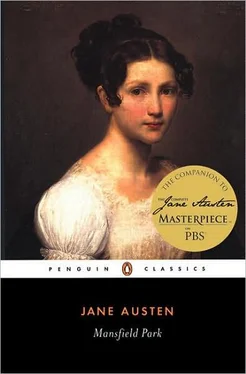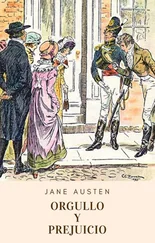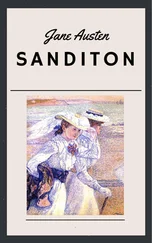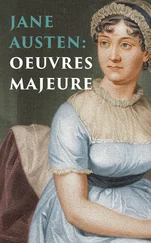Jane Austen - Mansfield Park
Здесь есть возможность читать онлайн «Jane Austen - Mansfield Park» — ознакомительный отрывок электронной книги совершенно бесплатно, а после прочтения отрывка купить полную версию. В некоторых случаях можно слушать аудио, скачать через торрент в формате fb2 и присутствует краткое содержание. Год выпуска: 1814, Жанр: Классическая проза, на английском языке. Описание произведения, (предисловие) а так же отзывы посетителей доступны на портале библиотеки ЛибКат.
- Название:Mansfield Park
- Автор:
- Жанр:
- Год:1814
- ISBN:нет данных
- Рейтинг книги:4 / 5. Голосов: 1
-
Избранное:Добавить в избранное
- Отзывы:
-
Ваша оценка:
- 80
- 1
- 2
- 3
- 4
- 5
Mansfield Park: краткое содержание, описание и аннотация
Предлагаем к чтению аннотацию, описание, краткое содержание или предисловие (зависит от того, что написал сам автор книги «Mansfield Park»). Если вы не нашли необходимую информацию о книге — напишите в комментариях, мы постараемся отыскать её.
Mansfield Park — читать онлайн ознакомительный отрывок
Ниже представлен текст книги, разбитый по страницам. Система сохранения места последней прочитанной страницы, позволяет с удобством читать онлайн бесплатно книгу «Mansfield Park», без необходимости каждый раз заново искать на чём Вы остановились. Поставьте закладку, и сможете в любой момент перейти на страницу, на которой закончили чтение.
Интервал:
Закладка:
"Is she not to live with you? I thought you had settled it with Sir Thomas."
"Me! never. I never spoke a syllable about it to Sir Thomas, nor he to me. Fanny live with me! the last thing in the world for me to think of, or for anybody to wish that really knows us both. Good heaven! what could I do with Fanny? Me! a poor, helpless, forlorn widow, unfit for anything, my spirits quite broke down; what could I do with a girl at her time of life? A girl of fifteen! the very age of all others to need most attention and care, and put the cheerfullest spirits to the test! Sure Sir Thomas could not seriously expect such a thing! Sir Thomas is too much my friend. Nobody that wishes me well, I am sure, would propose it. How came Sir Thomas to speak to you about it?"
"Indeed, I do not know. I suppose he thought it best."
"But what did he say? He could not say he wished me to take Fanny. I am sure in his heart he could not wish me to do it."
"No; he only said he thought it very likely; and I thought so too. We both thought it would be a comfort to you. But if you do not like it, there is no more to be said. She is no encumbrance here."
"Dear sister, if you consider my unhappy state, how can she be any comfort to me? Here am I, a poor desolate widow, deprived of the best of husbands, my health gone in attending and nursing him, my spirits still worse, all my peace in this world destroyed, with hardly enough to support me in the rank of a gentlewoman, and enable me to live so as not to disgrace the memory of the dear departed - what possible comfort could I have in taking such a charge upon me as Fanny? If I could wish it for my own sake, I would not do so unjust a thing by the poor girl. She is in good hands, and sure of doing well. I must struggle through my sorrows and difficulties as I can."
"Then you will not mind living by yourself quite alone?"
"Lady Bertram, I do not complain. I know I cannot live as I have done, but I must retrench where I can, and learn to be a better manager. I have been a liberal housekeeper enough, but I shall not be ashamed to practise economy now. My situation is as much altered as my income. A great many things were due from poor Mr. Norris, as clergyman of the parish, that cannot be expected from me. It is unknown how much was consumed in our kitchen by odd comers and goers. At the White House, matters must be better looked after. I must live within my income, or I shall be miserable; and I own it would give me great satisfaction to be able to do rather more, to lay by a little at the end of the year."
"I dare say you will. You always do, don't you?"
"My object, Lady Bertram, is to be of use to those that come after me. It is for your children's good that I wish to be richer. I have nobody else to care for, but I should be very glad to think I could leave a little trifle among them worth their having."
"You are very good, but do not trouble yourself about them. They are sure of being well provided for. Sir Thomas will take care of that."
"Why, you know, Sir Thomas's means will be rather straitened if the Antigua estate is to make such poor returns."
"Oh! that will soon be settled. Sir Thomas has been writing about it, I know."
"Well, Lady Bertram," said Mrs. Norris, moving to go, "I can only say that my sole desire is to be of use to your family: and so, if Sir Thomas should ever speak again about my taking Fanny, you will be able to say that my health and spirits put it quite out of the question; besides that, I really should not have a bed to give her, for I must keep a spare room for a friend."
Lady Bertram repeated enough of this conversation to her husband to convince him how much he had mistaken his sister-in-law's views; and she was from that moment perfectly safe from all expectation, or the slightest allusion to it from him. He could not but wonder at her refusing to do anything for a niece whom she had been so forward to adopt; but, as she took early care to make him, as well as Lady Bertram, understand that whatever she possessed was designed for their family, he soon grew reconciled to a distinction which, at the same time that it was advantageous and complimentary to them, would enable him better to provide for Fanny himself.
Fanny soon learnt how unnecessary had been her fears of a removal; and her spontaneous, untaught felicity on the discovery, conveyed some consolation to Edmund for his disappointment in what he had expected to be so essentially serviceable to her. Mrs. Norris took possession of the White House, the Grants arrived at the Parsonage, and these events over, everything at Mansfield went on for some time as usual.
The Grants showing a disposition to be friendly and sociable, gave great satisfaction in the main among their new acquaintance. They had their faults, and Mrs. Norris soon found them out. The Doctor was very fond of eating, and would have a good dinner every day; and Mrs. Grant, instead of contriving to gratify him at little expense, gave her cook as high wages as they did at Mansfield Park, and was scarcely ever seen in her offices. Mrs. Norris could not speak with any temper of such grievances, nor of the quantity of butter and eggs that were regularly consumed in the house. "Nobody loved plenty and hospitality more than herself; nobody more hated pitiful doings; the Parsonage, she believed, had never been wanting in comforts of any sort, had never borne a bad character in her time, but this was a way of going on that she could not understand. A fine lady in a country parsonage was quite out of place. Her store-room, she thought, might have been good enough for Mrs. Grant to go into. Inquire where she would, she could not find out that Mrs. Grant had ever had more than five thousand pounds."
Lady Bertram listened without much interest to this sort of invective. She could not enter into the wrongs of an economist, but she felt all the injuries of beauty in Mrs. Grant's being so well settled in life without being handsome, and expressed her astonishment on that point almost as often, though not so diffusely, as Mrs. Norris discussed the other.
These opinions had been hardly canvassed a year before another event arose of such importance in the family, as might fairly claim some place in the thoughts and conversation of the ladies. Sir Thomas found it expedient to go to Antigua himself, for the better arrangement of his affairs, and he took his eldest son with him, in the hope of detaching him from some bad connexions at home. They left England with the probability of being nearly a twelvemonth absent.
The necessity of the measure in a pecuniary light, and the hope of its utility to his son, reconciled Sir Thomas to the effort of quitting the rest of his family, and of leaving his daughters to the direction of others at their present most interesting time of life. He could not think Lady Bertram quite equal to supply his place with them, or rather, to perform what should have been her own; but, in Mrs. Norris's watchful attention, and in Edmund's judgment, he had sufficient confidence to make him go without fears for their conduct.
Lady Bertram did not at all like to have her husband leave her; but she was not disturbed by any alarm for his safety, or solicitude for his comfort, being one of those persons who think nothing can be dangerous, or difficult, or fatiguing to anybody but themselves.
The Miss Bertrams were much to be pitied on the occasion: not for their sorrow, but for their want of it. Their father was no object of love to them; he had never seemed the friend of their pleasures, and his absence was unhappily most welcome. They were relieved by it from all restraint; and without aiming at one gratification that would probably have been forbidden by Sir Thomas, they felt themselves immediately at their own disposal, and to have every indulgence within their reach. Fanny's relief, and her consciousness of it, were quite equal to her cousins'; but a more tender nature suggested that her feelings were ungrateful, and she really grieved because she could not grieve. "Sir Thomas, who had done so much for her and her brothers, and who was gone perhaps never to return! that she should see him go without a tear! it was a shameful insensibility." He had said to her, moreover, on the very last morning, that he hoped she might see William again in the course of the ensuing winter, and had charged her to write and invite him to Mansfield as soon as the squadron to which he belonged should be known to be in England. "This was so thoughtful and kind!" and would he only have smiled upon her, and called her "my dear Fanny," while he said it, every former frown or cold address might have been forgotten. But he had ended his speech in a way to sink her in sad mortification, by adding, "If William does come to Mansfield, I hope you may be able to convince him that the many years which have passed since you parted have not been spent on your side entirely without improvement; though, I fear, he must find his sister at sixteen in some respects too much like his sister at ten." She cried bitterly over this reflection when her uncle was gone; and her cousins, on seeing her with red eyes, set her down as a hypocrite.
Читать дальшеИнтервал:
Закладка:
Похожие книги на «Mansfield Park»
Представляем Вашему вниманию похожие книги на «Mansfield Park» списком для выбора. Мы отобрали схожую по названию и смыслу литературу в надежде предоставить читателям больше вариантов отыскать новые, интересные, ещё непрочитанные произведения.
Обсуждение, отзывы о книге «Mansfield Park» и просто собственные мнения читателей. Оставьте ваши комментарии, напишите, что Вы думаете о произведении, его смысле или главных героях. Укажите что конкретно понравилось, а что нет, и почему Вы так считаете.












